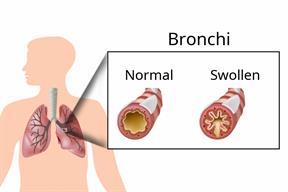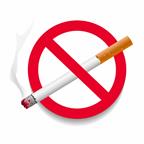Acute Bronchitis, Adult

Acute bronchitis is sudden inflammation of the main airways (bronchi) that come off the windpipe (trachea) in the lungs. The swelling causes the airways to get smaller and make more mucus than normal. This can make it hard to breathe and can cause coughing or noisy breathing (wheezing).
Acute bronchitis may last several weeks. The cough may last longer. Allergies, asthma, and exposure to smoke may make the condition worse.
What are the causes?
This condition can be caused by germs and by substances that irritate the lungs, including:
What increases the risk?
The following factors may make you more likely to develop this condition:
A weak body's defense system, also called the immune system.
A condition that affects your lungs and breathing, such as asthma.
What are the signs or symptoms?
Common symptoms of this condition include:
Coughing. This may bring up clear, yellow, or green mucus from your lungs (sputum).
Wheezing.
Runny or stuffy nose.
Having too much mucus in your lungs (chest congestion).
Shortness of breath.
Aches and pains, including sore throat or chest.
How is this diagnosed?
This condition is usually diagnosed based on:
You may also have other tests, including tests to rule out other conditions, such as pneumonia. These tests include:
How is this treated?
Most cases of acute bronchitis clear up over time without treatment. Your health care provider may recommend:
Drinking more fluids to help thin your mucus so it is easier to cough up.
Taking inhaled medicine (inhaler) to improve air flow in and out of your lungs.
Using a vaporizer or a humidifier. These are machines that add water to the air to help you breathe better.
Taking a medicine that thins mucus and clears congestion (expectorant).
Taking a medicine that prevents or stops coughing (cough suppressant).
It is not common to take an antibiotic medicine for this condition.
Follow these instructions at home:

-
Take over-the-counter and prescription medicines only as told by your health care provider.
-
Use an inhaler, vaporizer, or humidifier as told by your health care provider.
-
Take two teaspoons (10 mL) of honey at bedtime to lessen coughing at night.
-
Drink enough fluid to keep your urine pale yellow.
-
Do not use any products that contain nicotine or tobacco. These products include cigarettes, chewing tobacco, and vaping devices, such as e-cigarettes. If you need help quitting, ask your health care provider.
-
Get plenty of rest.
-
Return to your normal activities as told by your health care provider. Ask your health care provider what activities are safe for you.
-
Keep all follow-up visits. This is important.
How is this prevented?

To lower your risk of getting this condition again:
Wash your hands often with soap and water for at least 20 seconds. If soap and water are not available, use hand sanitizer.
Avoid contact with people who have cold symptoms.
Try not to touch your mouth, nose, or eyes with your hands.
Avoid breathing in smoke or chemical fumes. Breathing smoke or chemical fumes will make your condition worse.
Get the flu shot every year.
Contact a health care provider if:
-
Your symptoms do not improve after 2 weeks.
-
You have trouble coughing up the mucus.
-
Your cough keeps you awake at night.
-
You have a fever.
-
Cough up blood.
-
Feel pain in your chest.
-
Have severe shortness of breath.
-
Faint or keep feeling like you are going to faint.
-
Have a severe headache.
-
Have a fever or chills that get worse.
These symptoms may represent a serious problem that is an emergency. Do not wait to see if the symptoms will go away. Get medical help right away. Call your local emergency services (911 in the U.S.). Do not drive yourself to the hospital.
Summary
-
Acute bronchitis is inflammation of the main airways (bronchi) that come off the windpipe (trachea) in the lungs. The swelling causes the airways to get smaller and make more mucus than normal.
-
Drinking more fluids can help thin your mucus so it is easier to cough up.
-
Take over-the-counter and prescription medicines only as told by your health care provider.
-
Do not use any products that contain nicotine or tobacco. These products include cigarettes, chewing tobacco, and vaping devices, such as e-cigarettes. If you need help quitting, ask your health care provider.
-
Contact a health care provider if your symptoms do not improve after 2 weeks.
This information is not intended to replace advice given to you by your health care provider. Make sure you discuss any questions you have with your health care provider.


 To lower your risk of getting this condition again:
To lower your risk of getting this condition again: